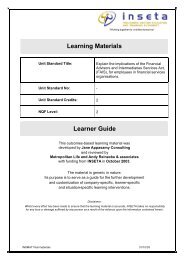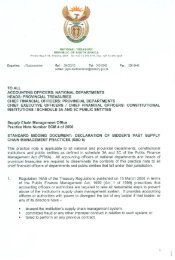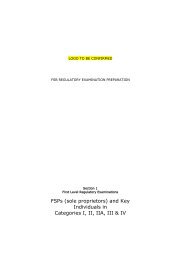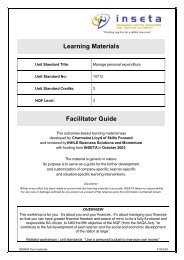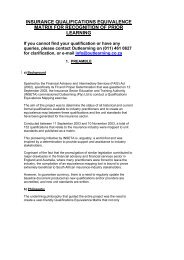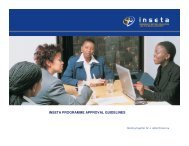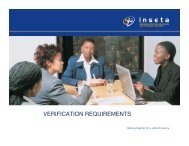SSP Brochure:Layout 1 - INSETA
SSP Brochure:Layout 1 - INSETA
SSP Brochure:Layout 1 - INSETA
Create successful ePaper yourself
Turn your PDF publications into a flip-book with our unique Google optimized e-Paper software.
Table 4.5 Scarce skills: sales occupationsOccupation*Posts difficult to fillInsurance agent or sales consultant 432Telemarketer 32Total 4644.1.5 Reasons for difficultiesOnly organisations that participated in the telephonic survey reported on the reasons why they had difficulties in finding suitable candidates.These organisations employed 50 or less people.In the managerial category the main problem identified was to find people with appropriate experience and the required qualifications. Inthe past, expertise in the insurance industry was usually gained by moving through the ranks and learning on-the-job. However, newlegislation such as FAIS subscribes formal qualifications to certain functions in the industry, while employment equity legislation necessitatesthe fast tracking of black managerial skills to address race and gender imbalances in employment. New entrants may have the necessaryqualifications but not the experience, while experienced people may not have formal qualifications.Similar to managers, employers found it difficult to recruit professionals for hard-to-fill positions because of a lack of appropriate experienceand required qualifications among candidates. Employers also identified an overall shortage of underwriting skills in the market.In the clerical and administrative worker category difficulties in filling vacancies were mainly related to a lack of experience, qualificationsand unrealistic salary demands, while the main problems given in the sales worker category were a lack of experience and too few blackcandidates.Representatives of professional organisations related skill shortages in the sector to:• Ageing of expertise and the lack of interest of younger skills to remain in the sector and gain experience• Over-regulated environment - new legislation makes the risks for brokers to loose income too high. Established brokerages remain withold clientele and newcomers to the sector are few• Lack of training by the sector – organisations tend to poach rather than train their own staff• Lack of marketing of the sector as a career destination - insurance is not a sector of choice and the available skilled staff opt for othercareer opportunities• Growth in business among previously disadvantaged segments of populationThere is a general lack of black professionals with industry experience and those skills that are available are usually unaffordable for mostorganisations.4.2 Skills gaps/Critical skillsDuring this <strong>SSP</strong> update professional associations were probed for possible skills gaps among people who are currently employed but notsufficiently skilled for their jobs. The concept skills gap or critical skill need refers to the qualitative shortcomings (gaps) in the skills ofemployees. These shortcomings are normally specifically related to a particular job and occur because of, among other things, insufficienttraining, changes in the work environment, for example technology upgrades, legislative changes and promotion. A lack of critical skills amongemployees could also result from skills shortages in the market, with employers’ unsuccessful attempts to employ suitably qualified peoplein scarce skills positions leading to the employment of people without the required skills apparatus. Skills gaps can generally be remediedthrough additional training, for example on-the-job training and short courses as well as through mentoring.First, respondents were of the opinion that a broadening of skills on all levels in the sector is needed to deal with clients professionally amidan increase in the complexity of products, increased client awareness and clients’ needs for comprehensive financial planning. In addition,the owners of small businesses in the sector (specifically small brokerages) need business-, strategic leadership- and IT skills. Althoughbrokers may have the skills and experience to sell products, many have not considered the impact of legislation on, among things, cash flowand risk management. Also, backroom brokerage staff often need multi-skilling to provide effective support to brokers.Second, skills gaps in the sector were linked to a lack of training, the impact of a “commission driven” environment and the absence of aformal education system for short term insurance in the past. According to respondents, organisations in insurance have a company ratherthan a sector outlook in terms of training. They train for their specific needs and usually do not want to expose staff to other areas ofexpertise for fear of loosing skills to other companies. Product providers push for product selling and brokers have to keep their contractswith them. The focus is therefore short term and on targets rather than on the development of skills.<strong>INSETA</strong> Sector Skills Plan - page 37






